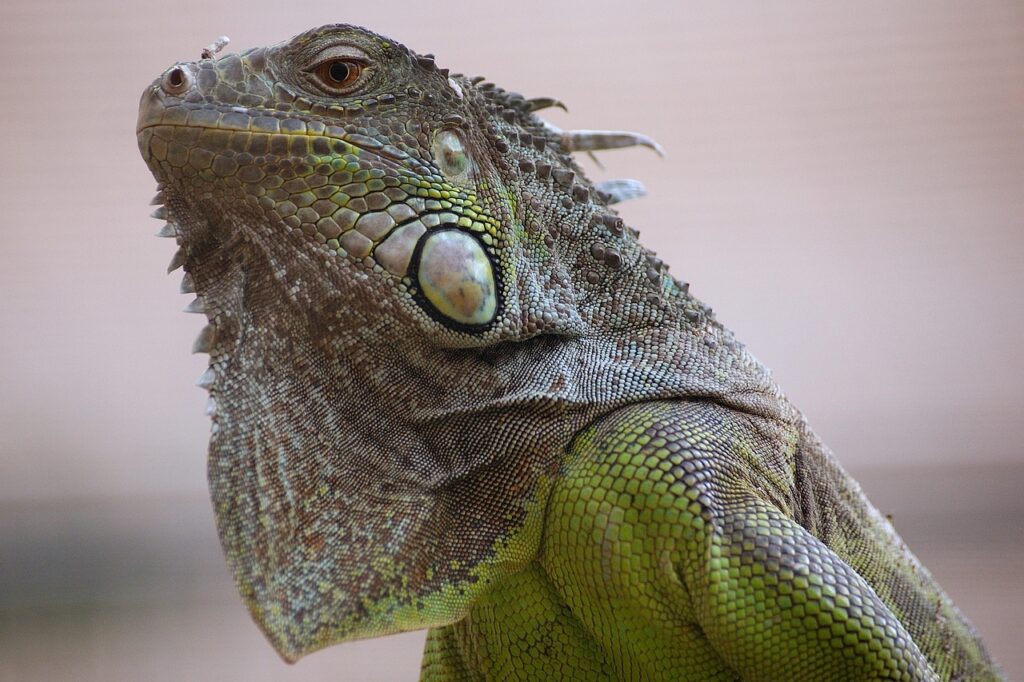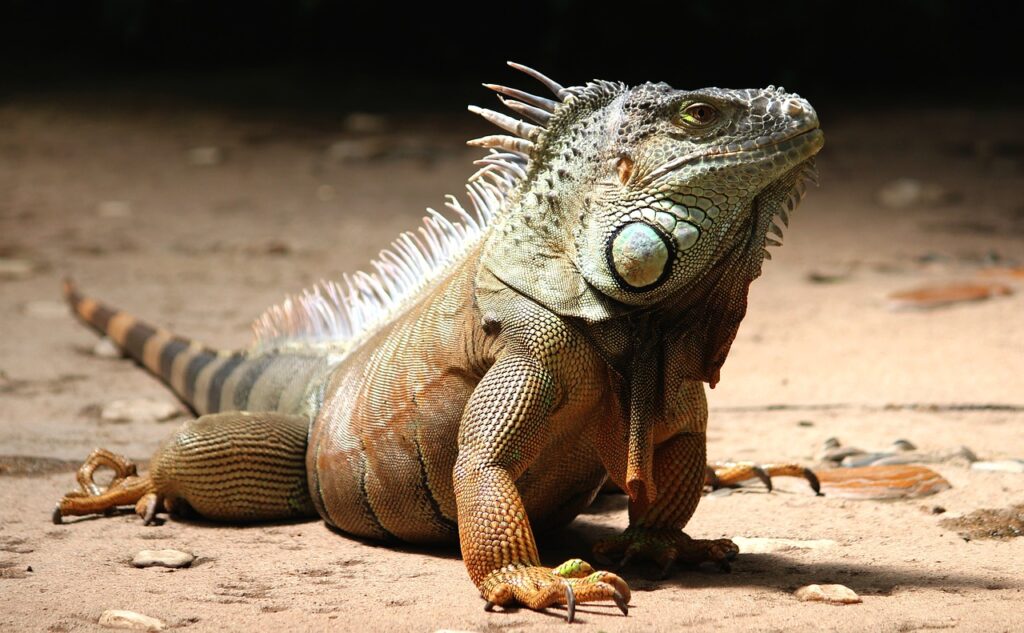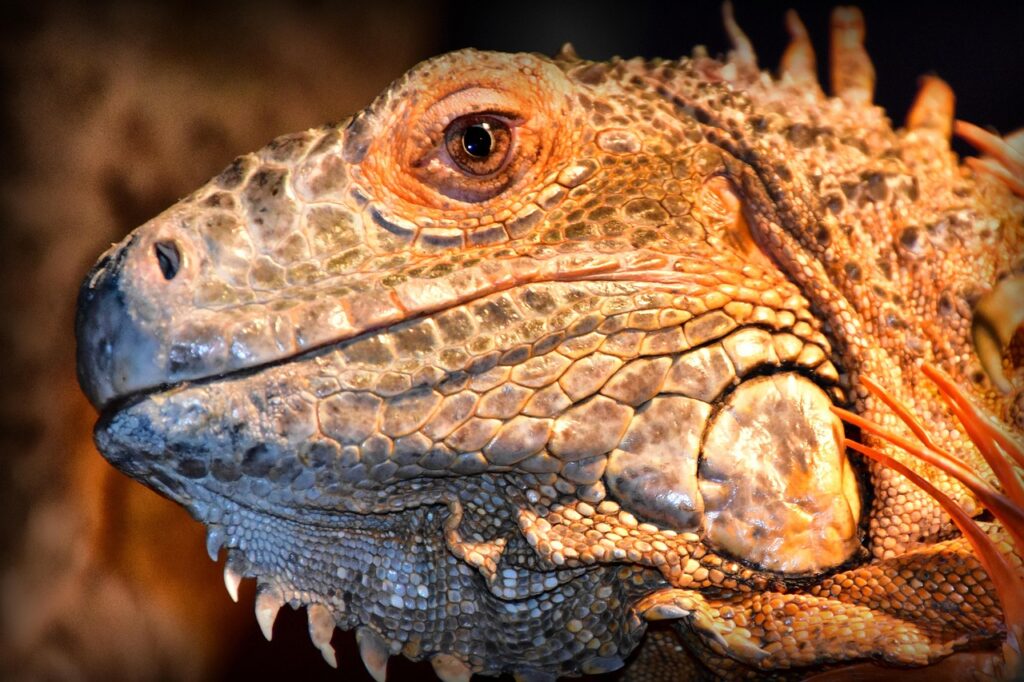Iguanas turning black can be alarming for any pet owner. Often, a color change in your iguana is a sign of stress or illness. Stress can be caused by changes in environment, handling, or diet.

Another reason might be health issues like infections or respiratory problems. If their habitat is too cold or too hot, it also might cause their color to darken.
Monitoring your iguana’s behavior and environment closely is crucial. If the color change persists, consulting a vet is a wise decision.
Understanding Iguana Coloration

Iguanas, like the green iguana and blue iguana, can change color for various reasons. This color change helps them blend in with their surroundings or signal different states.
Color changes are often related to mood, temperature, health, and age. An iguana feeling stressed or scared might turn darker, while one basking might change to absorb more heat.
Key Factors
- Camouflage: Helps iguanas blend into their environment to avoid predators.
- Body Temperature: Darker skin can absorb more heat, important for cold-blooded animals.
- Mood: Color changes can indicate stress, fear, or aggression.
- Health: Illnesses or poor health can alter an iguana’s color.
- Age: Younger iguanas often have brighter colors than older ones.
- Breeding Season: Color changes can occur during mating periods.
Common Colors and Their Meanings
| Color | Possible Reason |
|---|---|
| Green | Normal, healthy condition |
| Dark Brown or Black | Stress, cold environment |
| Blue | Specific to blue iguanas, may signal readiness to mate |
Environmental factors play a big role. An iguana turning black might be reacting to cooler temperatures or stress. Understanding these color changes can help in providing better care for your pet.
This knowledge of iguana coloration helps in interpreting their behavior and ensuring their well-being.
Factors Influencing Color Change in Iguanas

Iguanas can change color due to various reasons. These include the environment, physical condition, health, and emotional state.
Environmental Factors
Temperature can significantly affect an iguana’s color. When it’s cold, an iguana might turn black to absorb more heat. On hot days, they might be bright green to reflect sunlight.
Humidity also plays a role. If the environment is too dry, iguanas might turn brown. Seasonal changes, like the breeding season, can prompt color shifts as well.
Physiological Factors
During the breeding season, iguanas often change color. Males may turn red or orange to attract females.
Heat and temperature changes influence their physiology, causing color changes. Dehydration can make them darker. Age is another factor. Older iguanas may show different hues compared to young ones.
Health and Illness
Illness can cause color changes in iguanas. Health issues, such as infections or parasites, may make them turn darker. An ill iguana might show patches of black or brown.
Observation is key. If an iguana’s color darkens significantly, it’s a signal to check for underlying health problems. Regular vet visits help ensure their well-being.
Stress and Emotions
Stress greatly impacts an iguana’s color. A stressed iguana might turn black or brown. Scared or threatened iguanas often darken as well.
Happy and calm iguanas typically remain a bright green color. Ensuring a safe and stable environment helps maintain their natural hue. Addressing stress factors like improper handling or loud noises can prevent unwanted color changes.
Behavioral Responses and Physical Adaptations
Iguanas have several adaptations and behaviors that help them survive, including adjusting their coloration, body temperature, and social interactions. These changes are responses to their environment, threats, and mating needs.
Seasonal Adaptations
Iguanas change color based on seasons. During the breeding season, males may turn darker to attract females or show dominance. Marine iguanas turn black to absorb more heat from the sun, helping them stay warm after diving into cold sea waters. This change is crucial for regulating their body temperature and ensuring survival.
Thermoregulatory Behavior
Iguanas adjust their body temperature through behavior and physical changes. They might change color to absorb more heat or move between sunny and shaded areas. Marine iguanas bask in the sun to warm up after being in cold water. These thermoregulatory behaviors are necessary for their physiological processes, including digestion and movement.
Social Communications
Iguanas communicate through body language and color changes. Darker colors may signal mood or dominance. For example, males use head bobbing and dewlap displays to show dominance or attract females during mating season. These visual signals help iguanas create social hierarchies and avoid physical conflicts with other iguanas, ensuring smoother interactions among them.
When To Consult a Veterinarian
If your iguana is turning black, it might be time to speak with a veterinarian. Changes in color can be a warning sign of severe stress or other health issues.
Health Signs to Watch
- Skin infections: Black patches might indicate an infection.
- Parasites: Look for unusual markings or reddish-brown spots.
Behavior and Physical Changes
- Irides: Check if the eyes look different.
- Shedding process: Problems with shedding can indicate health issues.
- Bites or wounds: Any injuries can get infected.
Common Causes and Symptoms
- Temperature changes: Iguanas need a consistent environment.
- Fruits and vegetables: Ensure a balanced diet.
When They Seem Ill
- If the iguana stops eating, acts ill, or shows other unusual behavior, prompt action is needed.
Danger Signs
- Lifespan reduction: Changes might shorten their lifespan.
- Severe stress: Long-lasting color change could be due to stress.
Note
If your iguana shows any of these signs, quickly consult a veterinarian. An expert can provide the right treatment to keep your pet healthy.
